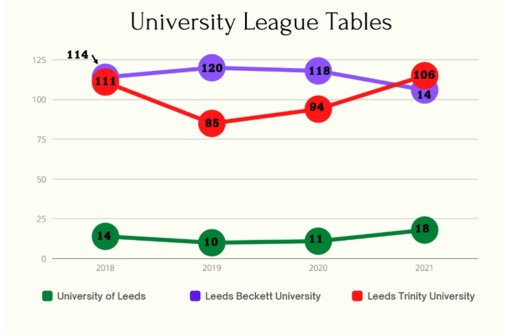Dropout rates for universities across Leeds have improved over the last few years, despite the pandemic hugely disrupting students’ education.
During the height of the pandemic, dissatisfied students led to the opening of 600 petitions criticising the Government’s response to Covid-19, which in total received over 4,800,000 signatures.
This was reflected in higher education (HE) withdrawal rates across the UK, which worsened by 5.9% in the 2019/20 academic year.
However, for the University of Leeds, Leeds Beckett and Leeds Trinity University, the rate of students dropping out after enrolment in HE has improved since 2018.


According to the latest figures from the Higher Education Policy Institute (HEPI) and the institutions themselves, all three major Leeds universities have seen a decline in withdrawal rates throughout the pandemic.
Out of the three institutions, Leeds Beckett has the highest dropout figures for the academic year 2018/19, but these decline by almost half the following year.
University of Leeds and Leeds Trinity also have steady falling figures across the three years.
This may seem surprising, as the Guardian University league tables, which measures aspects of university considered important for a prospective student, indicates student satisfaction across Leeds may have declined over the pandemic.

Across the year’s most impacted by covid, all three universities have fallen down the league tables, apart from Leeds Beckett that rose two places in 2020, but remains low in the charts.
The University of Leeds fell from being 10th in the league tables in 2019, to 18th in 2021, and Leeds Trinity also dropped considerably from 85th in 2019, to rank 106th in 2021.
So why do dropout rates not reflect this dissatisfaction?
“I had invested so much already that it would have been a waste to give that up.”
Miles wILKINS, ba philosophy
Miles Wilkins, a philosophy student who graduated from the University of Leeds in 2021 said: “Personally I found that the pandemic negatively impacted my learning experience at university.
“The lack of interaction in not having face-to-face lectures or seminars really felt like I was missing out on an integral part of higher education.”
He went on to say: “However, I decided against dropping out as I felt so close to completing my degree already and I thought, I’ve come this far so may as well finish it.”
A recent study by the Higher Education Statistics Agency (HESA) said that increases in retention rates “cannot be directly attributed” to the pandemic but added: “There is often a trend for increased higher education enrolments in periods of economic uncertainty and perhaps this behaviour extends to a desire to continue degree courses when other paths outside higher education are less certain.”
Luke Singleton, BA Architecture student at Leeds Beckett, explained the difficulties of online learning when studying a creative subject: “In my opinion, my course was severely impacted by covid, as it was a creative arts course and we relied heavily on visual communication to convey our ideas.
“Before covid the style of learning was constant as we are all in the same studio, however during, it was contained to a weekly one-to-one session via teams, and this had its drawbacks.”
However, once again when asked about dropping out he explained: “In terms of dropping out, I never considered it. I knew I wanted to pursue a career in architecture and enjoyed it even during covid.
“I wanted to study architecture before the pandemic and that has not changed because of it!”
It seems that despite dissatisfied students throughout the pandemic, the determination to get a degree regardless of disrupted learning, outweighed the choice to withdraw from HE.
As Miles Wilkins said: “I had invested so much already that it would have been a waste to give that up.”
All three universities were contacted for a statement.
